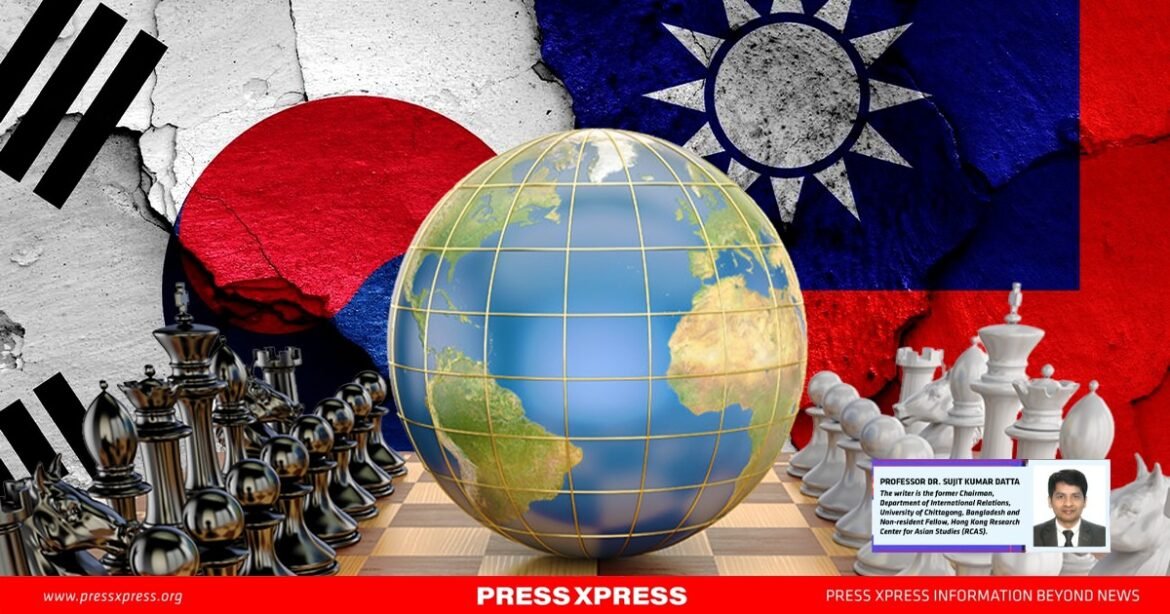Asia is currently facing a complex geopolitical crisis. The Taiwan-Korea crisis centers on China’s growing regional influence, South Korea’s economic dependence, U.S. military commitments, and the future of maritime trade. Rising tensions between China and the United States over Taiwan could seriously affect regional stability and the entire Asian and global economy. Although the United States and South Korea do not have direct military relations with Taiwan, resolving this crisis is especially important, given their economic and security ties with Taiwan.
The South Korean economy heavily depends on international trade, supply chains, and import-export movements. Ninety percent of South Korea’s commercial maritime traffic passes through the Taiwan Strait and the South China Sea. Taiwan and South Korea are the fifth largest trading partner. Taiwan produces 60 percent of the world’s semiconductors and 92 percent of the most advanced logic chips.
The Taiwan crisis could disrupt South Korea’s manufacturing and technology supply chains. According to Bloomberg, China’s invasion of Taiwan has cost the world economy about $10 trillion, equivalent to 10 percent of the world’s GDP. Blocking Taiwan, on the other hand, could cost around $5 trillion.
The United States also bears an important responsibility in the Taiwan crisis. The United States and South Korea have signed a bilateral defense agreement under which the United States is committed to defending South Korea. With South Korea included in the U.S.-South Korean joint forces command structure, the Taiwan crisis adds to South Korea’s security risks. Maintaining stability in Northeast Asia is a strategic imperative for the United States, not least in the Taiwan crisis.
To resolve the Taiwan crisis, the United States, its allies, and partners are endeavoring to fortify their military forces, enhance joint weapons development and production, and enhance multilateral security cooperation. Given South Korea’s status as a strategic ally, the United States is expected to pursue military collaboration with South Korea during the Taiwan crisis. The United States anticipates that South Korea will enhance its defensive capabilities and offer logistical support for U.S. operations in Taiwan.
The Taiwan crisis has resulted in a problematic situation for South Korea. South Korea is a significant ally of the United States; conversely, it maintains substantial economic connections with China. South Korea has chosen to remain silent on the Taiwan crisis, refraining from overt criticism of China. The military threat from North Korea and China’s economic influence are the main reasons for South Korea’s restrained response to the Taiwan crisis. Given that China is South Korea’s largest trading partner, Seoul is concerned about China’s reaction. If military tensions over Taiwan escalate, South Korea’s economy will suffer severely.
To maintain stability in the Asian region and ensure the international community’s security, South Korea must play an active role. South Korea needs to rethink its role as a “global pivot state,” where it will be more active in safeguarding national security. Support from the international community during the Taiwan crisis could be important for South Korea. Although Seoul does not directly participate in the defense of Taiwan, it can help protect and resupply the US military.
South Korea’s strategy of not getting directly involved in the Taiwan crisis leads to maintaining economic relations and could weaken its position as a US ally. South Korea’s lack of cooperation in the Taiwan crisis could challenge relations with the United States. The United States expects South Korea to help maintain stability in the Asian region and contribute directly and indirectly to the Taiwan crisis. If the China-Taiwan crisis escalates into a war, there is a risk of a major conflict in the Asian region.
Consequently, the security systems of the United States, Japan, and South Korea may require revision, and regional security may also be at risk. Furthermore, there exists a potential for a disruption in trade supply chains within the Asian region, which would significantly affect the global economy.
The Korea-Taiwan crisis is causing an uncertain future for Asia. The situation regarding Taiwan presents a significant dilemma for South Korea, compelling Seoul to evaluate its economic and security priorities carefully. South Korea may be able to influence the situation in Taiwan in light of the military agreement with the United States.
The Sino-Taiwan crisis can potentially engender novel dynamics of power competition within Asia, thereby jeopardizing the entire region’s stability. If the Taiwan crisis leads to war, it could lead to a deep crisis throughout Asia, which would negatively affect the local and global economy.


